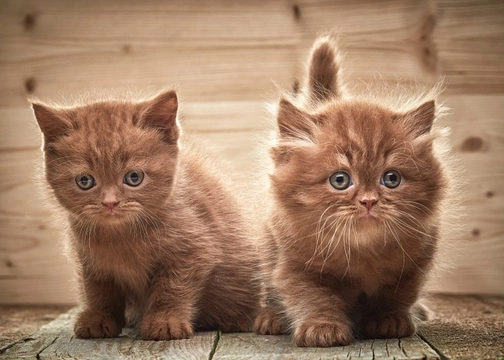
Interesting Things about Kittens
Kittens are so cute even when they are first born and their eyes are shut. For the first few days and weeks, kittens are extremely vulnerable which means they need extra care from their mothers. This involves her giving them very specific things so they can go on to grow into healthy mature cats. This article explains just what kittens need when they are first born.
Average weight of newborn kittens
When kittens are first born, they weigh around 110 grams and they gain approximately 100 grams a week. This means that when a kitten is 4 weeks old, their weight should be about 450 grams. For a kitten to grow properly, they need to gain 450 grams every month until they are six months old.
Mum gives kittens all-important colostrum
Kittens get the all-important colostrum from their mothers in the first day or two of their lives. This is essential to their well-being because mum passes on antibodies to her kittens which could potentially save their lives. Colostrum is essential for a kitten to have a strong immune system which helps them fight off infection and diseases.
Newborn kittens need heat
During the first weeks of their lives, kittens need to be kept warm to survive. Studies have established that the ideal warmth needed is 90 degrees F. Kittens also need enough room to move around and cool down when they get too hot which is the only way they have of reducing the risk of overheating.
Newborn kittens are totally reliant on mum
Newborn kittens rely totally on their mothers to begin with because not only are their eyes tightly shut, but their ear canals are closed too. This means they cannot hear either. A kittens' eyes start to open when they are anything from seven to fourteen days old. They start hearing when they are about ten to fourteen days old. Another interesting thing is that a kitten's eye colour changes from blue to their eventual colour when they are around eight weeks old.
Newborn kittens need to eat frequently
When kittens are first born, they need to feed every 2 to 3 hours which they do by suckling off their mothers. However, if a kitten needs to be bottle fed, this means hand feeding them at the same rate making sure they are fed with their tummies facing down to reduce the risk aspirating the fluid which could result in a kitten suffering from aspiration pneumonia. A kitten only starts to eat solid food when they are between 3 to 4 weeks old. It is worth noting that if a kitten does not eat enough, they risk having a lower blood sugar count which could prove life-threatening.
Kittens need help to go to the toilet
Kittens cannot go to the toilet on their own and that's why mum stimulates them by cleaning their backends. If mum is not around, this needs to be done by using a clean, moist and warm cloth which acts much in the same way as a mum licking a kitten's rear end.
Kittens get their baby teeth at about three weeks old
A kitten's baby teeth start to appear when they are around 3 weeks old, but they lose these first teeth when they are fourteen weeks old which is when they adult teeth start to push through. It is only when they are 6 months old that they have their full set of adult teeth.
Kittens start playing at a few weeks old
A healthy kitten should be standing up when they are around ten days old and by twenty-one days, they should be able to walk around albeit unsteadily. Kittens start to play when they are around four weeks old which is when things start to get very amusing.
Kittens are delicate
Kittens are quite delicate when it comes to fleas because they are at greater risk of suffering from flea related anaemia. This could prove life-threatening even to a healthy eight week old kitten. It's very important to make sure their mother does not have fleas when she gives birth to her kittens.
Kittens are fully weaned at around 8 weeks old
Kittens are usually fully weaned when they are around 8 weeks old and it would be a big mistake to take a kitten away from their mother any earlier both for health reasons and because they would miss out on learning valuable social skills.



